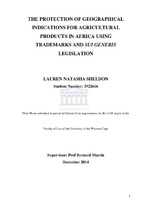The protection of geographical indications for agricultural products in Africa using trademarks and sui generis legislation
Abstract
A geographical indication (GI) is a sign by which a product is identified as having its origin in a particular territory and as having certain qualities, characteristics and a reputation, which are associated with that origin. There is currently no uniform international mechanism of protecting GIs, however, the framework for the protection of GIs is provided by Articles 22 to 24 of the Agreement on Trade-Related Aspects of Intellectual Property Rights (TRIPS). Article 23.1 provides a distinct advantage for the protection of wines and spirits as compared to the general protection of Article 22 for all other products. This thesis argues that a uniform system of protection for GIs should be established internationally, and that protection would be to the advantage of developing countries. The purpose of this study is to determine the best available method (i.e. trademark legislation or sui generis legislation) for protecting GIs for agricultural products of developing countries, through analysing the international legal framework governing the protection of GIs and the methods of national protection available as applied in Ethiopia, South Africa and India. The central argument advanced is that the use of trademarks should be a stepping stone, sui generis legislation is the ideal. Sui generis (separate) legislation should be drafted to fulfil the obligations of TRIPS and to ensure the extended protection, through national legislation, of all goods within other Member States. It is highly unlikely that the TRIPS Member States will agree to the extended protection of the Article 23. Therefore, the most suitable method to achieve such protection would be for Member States to extend their national protection through sui generis legislation.

